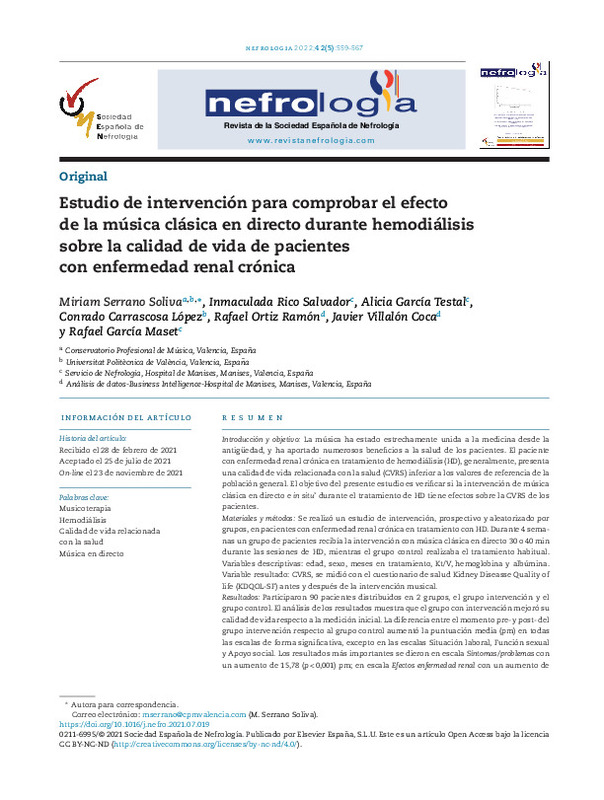|
Resumen:
|
[EN] Introduction and objective
Music has been closely linked to medicine since ancient times, and has brought numerous benefits to the health of patients. Patients with chronic kidney disease undergoing hemodialysis (HD) ...[+]
[EN] Introduction and objective
Music has been closely linked to medicine since ancient times, and has brought numerous benefits to the health of patients. Patients with chronic kidney disease undergoing hemodialysis (HD) generally have a health-related quality of life (HRQL) lower than the reference values of the general population. The objective of the present study is to verify if the intervention of classical music live and ¿in situ¿ during the treatment of HD has effects on the HRQL of the patients.
Materials and methods
A prospective, group-randomized intervention study of 4 weeks¿ duration was carried out in patients with chronic kidney disease undergoing HD. Descriptive variables are included for data analysis: age, sex, months in treatment, Kt/V, hemoglobin and albumin. Result variable: HRQL, measured with the Kidney Disease health questionnaire Quality of Life (KDQOL-SF) before and after the musical intervention.
Results
90 patients participated in 2 groups, the intervention group and the control group. The analysis of the results shows that the intervention group improved their quality of life compared to the initial measurement. The difference between the pre and post time of the intervention group with respect to the control group increased the mean score (pm) in all the scales significantly, except in the Work situation, Sexual function and Social support scales. The most important results were given on the Symptoms/problems scale with an increase of 15.78 (P < .001) pm; in scale Effects of kidney disease with an increase of 14.96 (P < .001) pm; in scale Burden of kidney disease with an increase of 16.36 (P < .001) pm; on the Dream scale with an increase of 14.78 (P < .001) pm; on the Vitality scale with an increase of 25.46 (P < .001) pm; on the Emotional well-being scale with an increase of 29.57 (P < .001) pm; on the Pain scale with an increase of 41.92 (P < .001) pm and on the General Health scale with an increase of 23.39 (P < .001) pm.
[-]
[ES] Introducción y objetivo
La música ha estado estrechamente unida a la medicina desde la antigüedad, y ha aportado numerosos beneficios a la salud de los pacientes. El paciente con enfermedad renal crónica en tratamiento ...[+]
[ES] Introducción y objetivo
La música ha estado estrechamente unida a la medicina desde la antigüedad, y ha aportado numerosos beneficios a la salud de los pacientes. El paciente con enfermedad renal crónica en tratamiento de hemodiálisis (HD), generalmente, presenta una calidad de vida relacionada con la salud (CVRS) inferior a los valores de referencia de la población general. El objetivo del presente estudio es verificar si la intervención de música clásica en directo e in situ¿ durante el tratamiento de HD tiene efectos sobre la CVRS de los pacientes.
Materiales y métodos
Se realizó un estudio de intervención, prospectivo y aleatorizado por grupos, en pacientes con enfermedad renal crónica en tratamiento con HD. Durante 4 semanas un grupo de pacientes recibía la intervención con música clásica en directo 30 o 40 min durante las sesiones de HD, mientras el grupo control realizaba el tratamiento habitual. Variables descriptivas: edad, sexo, meses en tratamiento, Kt/V, hemoglobina y albúmina. Variable resultado: CVRS, se midió con el cuestionario de salud Kidney Diseasse Quality of life (KDQOL-SF) antes y después de la intervención musical.
Resultados
Participaron 90 pacientes distribuidos en 2 grupos, el grupo intervención y el grupo control. El análisis de los resultados muestra que el grupo con intervención mejoró su calidad de vida respecto a la medición inicial. La diferencia entre el momento pre- y post- del grupo intervención respecto al grupo control aumentó la puntuación media (pm) en todas las escalas de forma significativa, excepto en las escalas Situación laboral, Función sexual y Apoyo social. Los resultados más importantes se dieron en escala Síntomas/problemas con un aumento de 15,78 (p < 0,001) pm; en escala Efectos enfermedad renal con un aumento de 14,96 (p < 0,001) pm; en escala Carga enfermedad renal con un aumento de 16,36 (p < 0,001) pm; en escala Sueño con un aumento de 14,78 (p < 0,001) pm; en escala Vitalidad con un aumento de 25,46 (p < 0,001) pm; en escala Bienestar emocional con un aumento de 29,57 (p < 0,001) pm; en escala Dolor con un aumento de 41,92 (p < 0,001) pm y en escala Salud General con un aumento de 23,39 (p < 0,001) pm.
Conclusión
La intervención con música en directo durante el proceso de tratamiento de HD mejora la CVRS autopercibida en pacientes con enfermedad renal crónica.
[-]
|









